Entrepreneurship and Small Business: A Comprehensive Analysis Report
VerifiedAdded on 2020/10/22
|14
|4183
|492
Report
AI Summary
This report delves into the multifaceted world of entrepreneurship, examining various types of ventures, including small businesses, social ventures, scalable ventures, and large-scale enterprises. It analyzes the similarities and differences between these ventures, providing a comprehensive understanding of their operational structures and objectives. The report further assesses the impact of micro and small businesses on the UK economy, highlighting their contribution to market growth and employment generation. It also emphasizes the significance of small businesses and start-ups in fostering social and economic growth. Additionally, the report explores the characteristic traits and skills of successful entrepreneurs, differentiating them from traditional business managers, and discusses how entrepreneurial personality traits influence motivation and mindset. Finally, it examines how background and experience can either hinder or foster entrepreneurial endeavors.
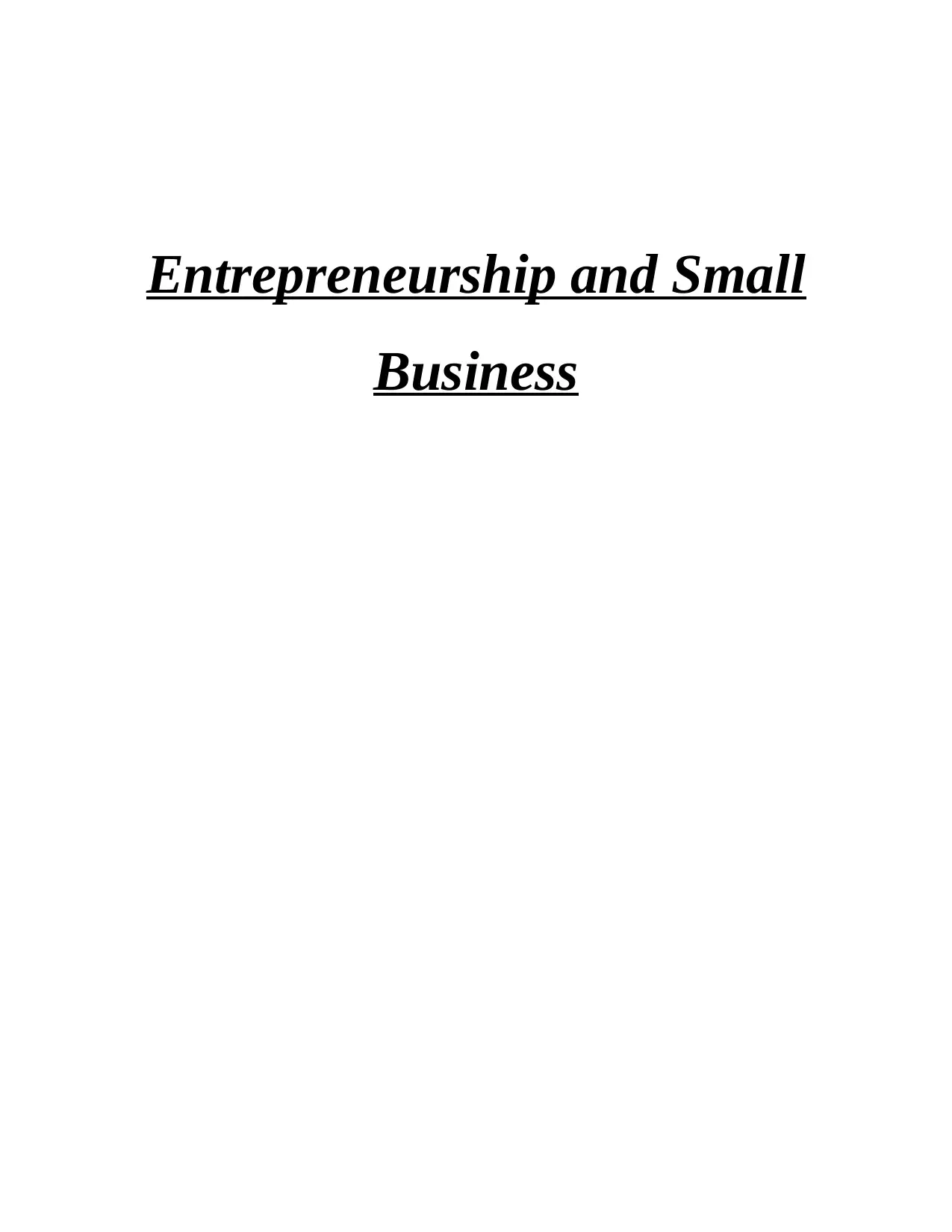
Entrepreneurship and Small
Business
Business
Paraphrase This Document
Need a fresh take? Get an instant paraphrase of this document with our AI Paraphraser
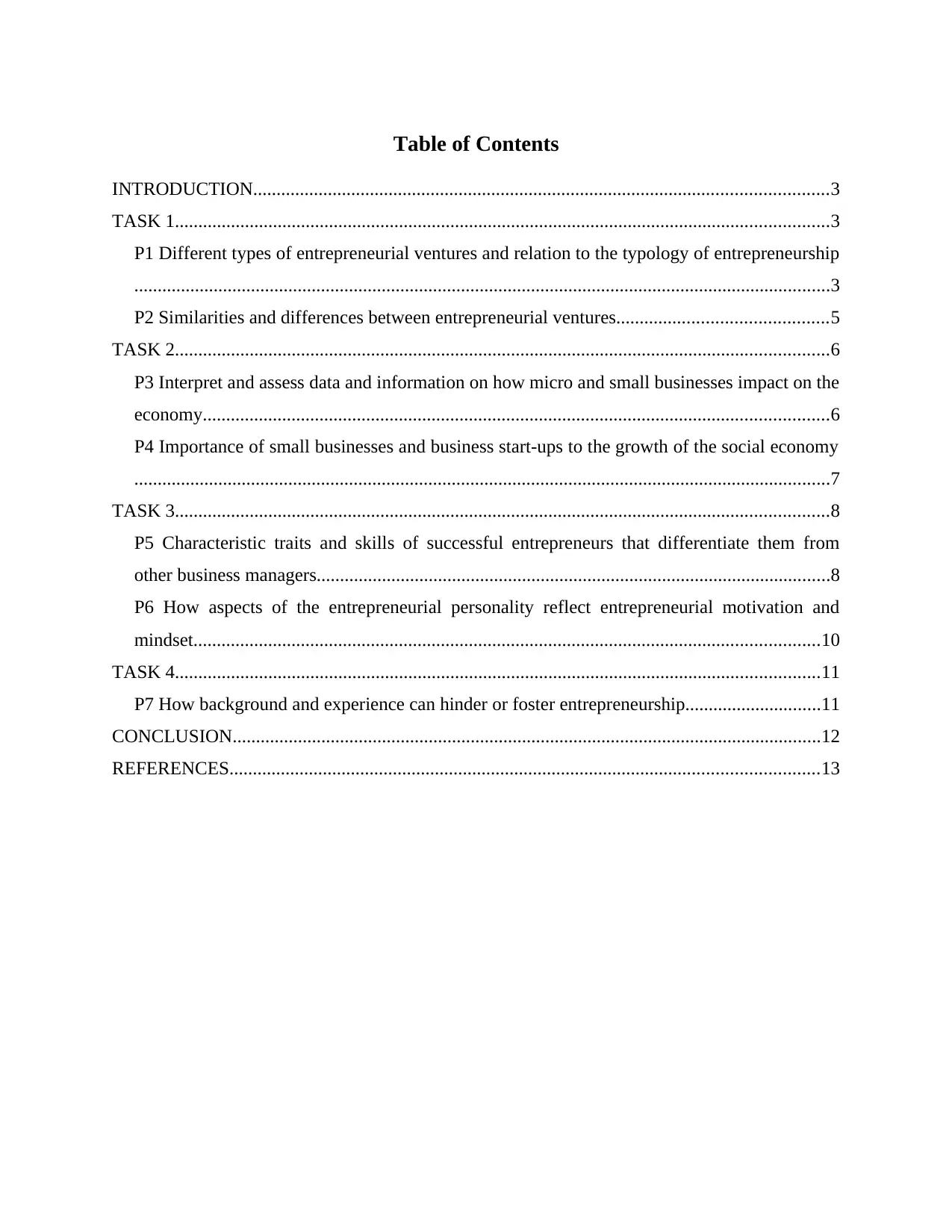
Table of Contents
INTRODUCTION...........................................................................................................................3
TASK 1............................................................................................................................................3
P1 Different types of entrepreneurial ventures and relation to the typology of entrepreneurship
.....................................................................................................................................................3
P2 Similarities and differences between entrepreneurial ventures.............................................5
TASK 2............................................................................................................................................6
P3 Interpret and assess data and information on how micro and small businesses impact on the
economy......................................................................................................................................6
P4 Importance of small businesses and business start-ups to the growth of the social economy
.....................................................................................................................................................7
TASK 3............................................................................................................................................8
P5 Characteristic traits and skills of successful entrepreneurs that differentiate them from
other business managers..............................................................................................................8
P6 How aspects of the entrepreneurial personality reflect entrepreneurial motivation and
mindset......................................................................................................................................10
TASK 4..........................................................................................................................................11
P7 How background and experience can hinder or foster entrepreneurship.............................11
CONCLUSION..............................................................................................................................12
REFERENCES..............................................................................................................................13
INTRODUCTION...........................................................................................................................3
TASK 1............................................................................................................................................3
P1 Different types of entrepreneurial ventures and relation to the typology of entrepreneurship
.....................................................................................................................................................3
P2 Similarities and differences between entrepreneurial ventures.............................................5
TASK 2............................................................................................................................................6
P3 Interpret and assess data and information on how micro and small businesses impact on the
economy......................................................................................................................................6
P4 Importance of small businesses and business start-ups to the growth of the social economy
.....................................................................................................................................................7
TASK 3............................................................................................................................................8
P5 Characteristic traits and skills of successful entrepreneurs that differentiate them from
other business managers..............................................................................................................8
P6 How aspects of the entrepreneurial personality reflect entrepreneurial motivation and
mindset......................................................................................................................................10
TASK 4..........................................................................................................................................11
P7 How background and experience can hinder or foster entrepreneurship.............................11
CONCLUSION..............................................................................................................................12
REFERENCES..............................................................................................................................13
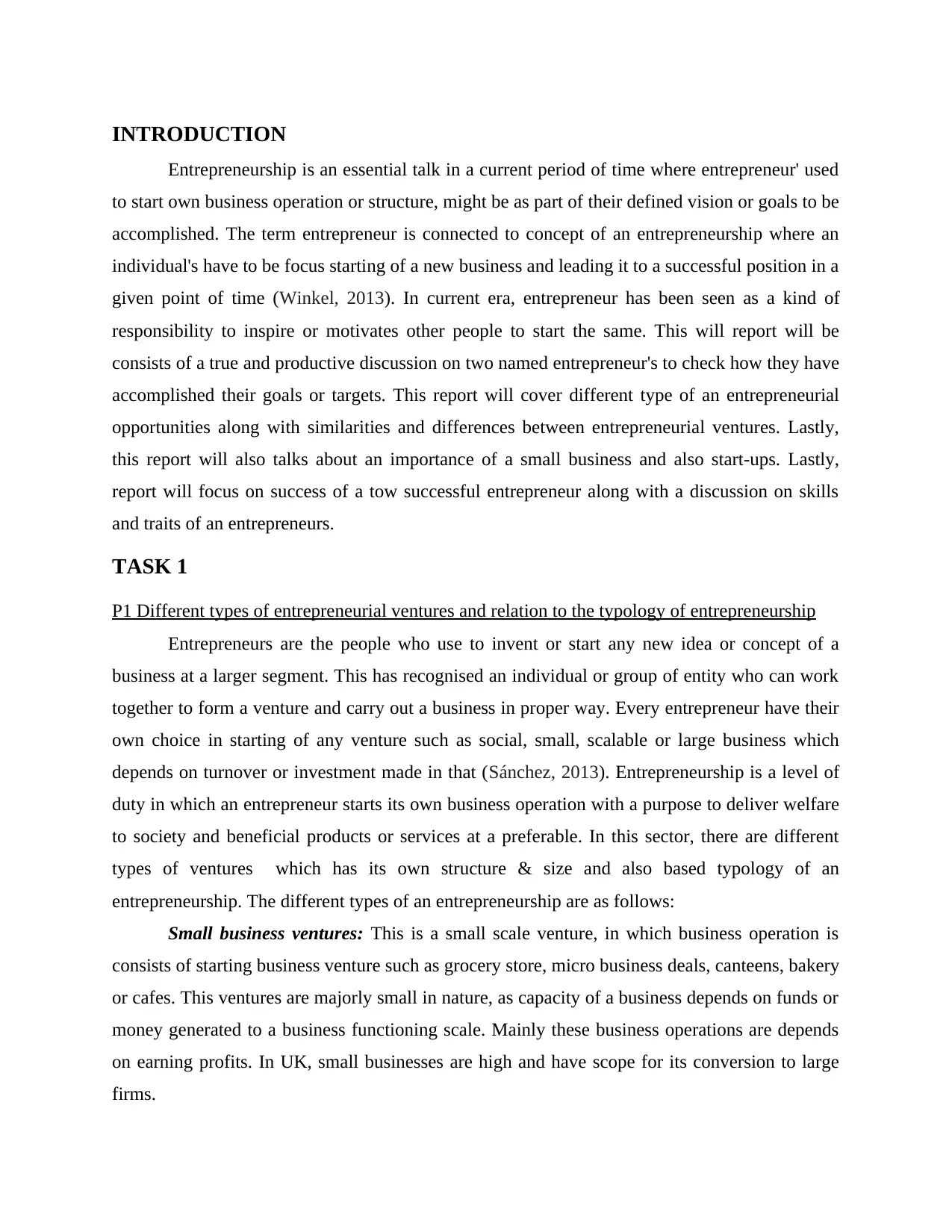
INTRODUCTION
Entrepreneurship is an essential talk in a current period of time where entrepreneur' used
to start own business operation or structure, might be as part of their defined vision or goals to be
accomplished. The term entrepreneur is connected to concept of an entrepreneurship where an
individual's have to be focus starting of a new business and leading it to a successful position in a
given point of time (Winkel, 2013). In current era, entrepreneur has been seen as a kind of
responsibility to inspire or motivates other people to start the same. This will report will be
consists of a true and productive discussion on two named entrepreneur's to check how they have
accomplished their goals or targets. This report will cover different type of an entrepreneurial
opportunities along with similarities and differences between entrepreneurial ventures. Lastly,
this report will also talks about an importance of a small business and also start-ups. Lastly,
report will focus on success of a tow successful entrepreneur along with a discussion on skills
and traits of an entrepreneurs.
TASK 1
P1 Different types of entrepreneurial ventures and relation to the typology of entrepreneurship
Entrepreneurs are the people who use to invent or start any new idea or concept of a
business at a larger segment. This has recognised an individual or group of entity who can work
together to form a venture and carry out a business in proper way. Every entrepreneur have their
own choice in starting of any venture such as social, small, scalable or large business which
depends on turnover or investment made in that (Sánchez, 2013). Entrepreneurship is a level of
duty in which an entrepreneur starts its own business operation with a purpose to deliver welfare
to society and beneficial products or services at a preferable. In this sector, there are different
types of ventures which has its own structure & size and also based typology of an
entrepreneurship. The different types of an entrepreneurship are as follows:
Small business ventures: This is a small scale venture, in which business operation is
consists of starting business venture such as grocery store, micro business deals, canteens, bakery
or cafes. This ventures are majorly small in nature, as capacity of a business depends on funds or
money generated to a business functioning scale. Mainly these business operations are depends
on earning profits. In UK, small businesses are high and have scope for its conversion to large
firms.
Entrepreneurship is an essential talk in a current period of time where entrepreneur' used
to start own business operation or structure, might be as part of their defined vision or goals to be
accomplished. The term entrepreneur is connected to concept of an entrepreneurship where an
individual's have to be focus starting of a new business and leading it to a successful position in a
given point of time (Winkel, 2013). In current era, entrepreneur has been seen as a kind of
responsibility to inspire or motivates other people to start the same. This will report will be
consists of a true and productive discussion on two named entrepreneur's to check how they have
accomplished their goals or targets. This report will cover different type of an entrepreneurial
opportunities along with similarities and differences between entrepreneurial ventures. Lastly,
this report will also talks about an importance of a small business and also start-ups. Lastly,
report will focus on success of a tow successful entrepreneur along with a discussion on skills
and traits of an entrepreneurs.
TASK 1
P1 Different types of entrepreneurial ventures and relation to the typology of entrepreneurship
Entrepreneurs are the people who use to invent or start any new idea or concept of a
business at a larger segment. This has recognised an individual or group of entity who can work
together to form a venture and carry out a business in proper way. Every entrepreneur have their
own choice in starting of any venture such as social, small, scalable or large business which
depends on turnover or investment made in that (Sánchez, 2013). Entrepreneurship is a level of
duty in which an entrepreneur starts its own business operation with a purpose to deliver welfare
to society and beneficial products or services at a preferable. In this sector, there are different
types of ventures which has its own structure & size and also based typology of an
entrepreneurship. The different types of an entrepreneurship are as follows:
Small business ventures: This is a small scale venture, in which business operation is
consists of starting business venture such as grocery store, micro business deals, canteens, bakery
or cafes. This ventures are majorly small in nature, as capacity of a business depends on funds or
money generated to a business functioning scale. Mainly these business operations are depends
on earning profits. In UK, small businesses are high and have scope for its conversion to large
firms.
⊘ This is a preview!⊘
Do you want full access?
Subscribe today to unlock all pages.

Trusted by 1+ million students worldwide
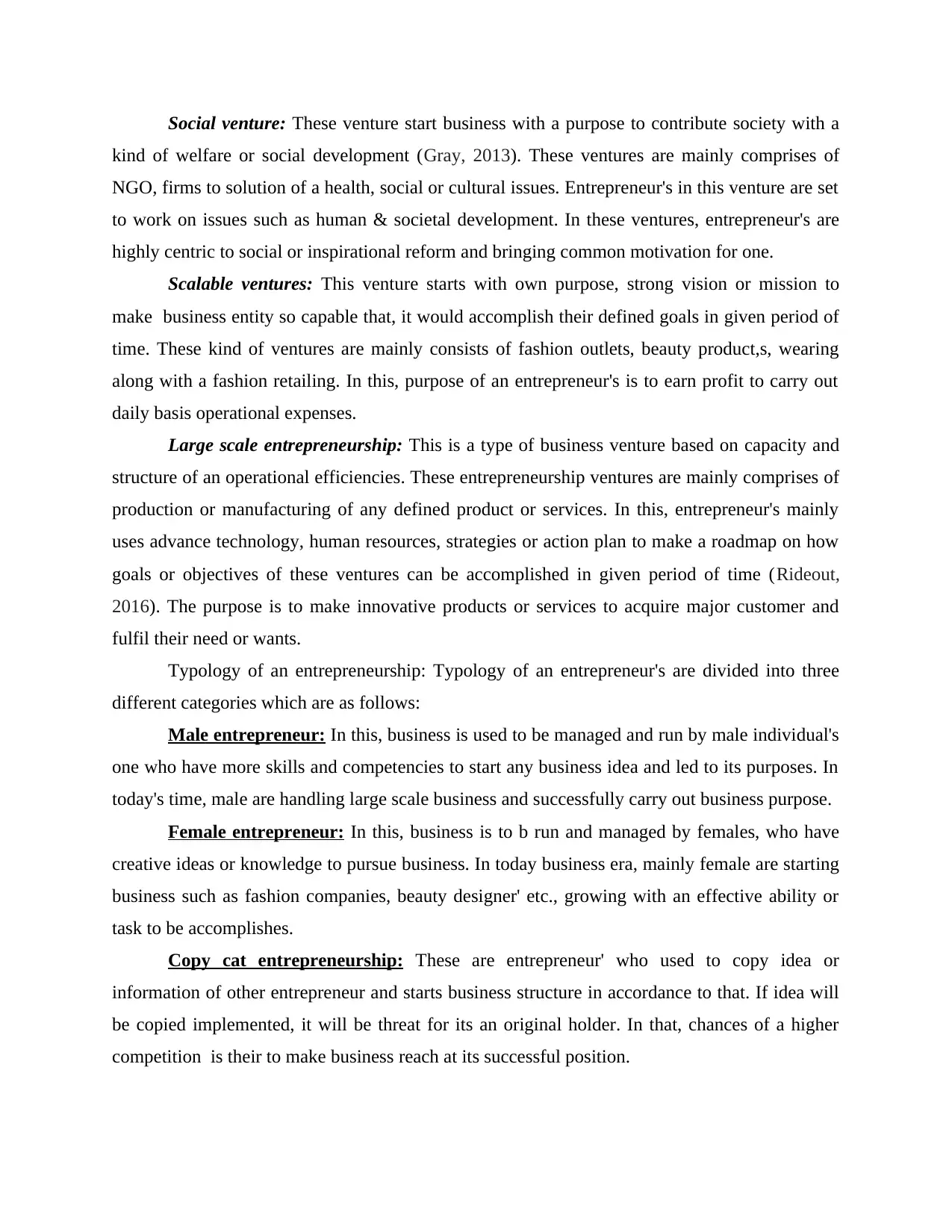
Social venture: These venture start business with a purpose to contribute society with a
kind of welfare or social development (Gray, 2013). These ventures are mainly comprises of
NGO, firms to solution of a health, social or cultural issues. Entrepreneur's in this venture are set
to work on issues such as human & societal development. In these ventures, entrepreneur's are
highly centric to social or inspirational reform and bringing common motivation for one.
Scalable ventures: This venture starts with own purpose, strong vision or mission to
make business entity so capable that, it would accomplish their defined goals in given period of
time. These kind of ventures are mainly consists of fashion outlets, beauty product,s, wearing
along with a fashion retailing. In this, purpose of an entrepreneur's is to earn profit to carry out
daily basis operational expenses.
Large scale entrepreneurship: This is a type of business venture based on capacity and
structure of an operational efficiencies. These entrepreneurship ventures are mainly comprises of
production or manufacturing of any defined product or services. In this, entrepreneur's mainly
uses advance technology, human resources, strategies or action plan to make a roadmap on how
goals or objectives of these ventures can be accomplished in given period of time (Rideout,
2016). The purpose is to make innovative products or services to acquire major customer and
fulfil their need or wants.
Typology of an entrepreneurship: Typology of an entrepreneur's are divided into three
different categories which are as follows:
Male entrepreneur: In this, business is used to be managed and run by male individual's
one who have more skills and competencies to start any business idea and led to its purposes. In
today's time, male are handling large scale business and successfully carry out business purpose.
Female entrepreneur: In this, business is to b run and managed by females, who have
creative ideas or knowledge to pursue business. In today business era, mainly female are starting
business such as fashion companies, beauty designer' etc., growing with an effective ability or
task to be accomplishes.
Copy cat entrepreneurship: These are entrepreneur' who used to copy idea or
information of other entrepreneur and starts business structure in accordance to that. If idea will
be copied implemented, it will be threat for its an original holder. In that, chances of a higher
competition is their to make business reach at its successful position.
kind of welfare or social development (Gray, 2013). These ventures are mainly comprises of
NGO, firms to solution of a health, social or cultural issues. Entrepreneur's in this venture are set
to work on issues such as human & societal development. In these ventures, entrepreneur's are
highly centric to social or inspirational reform and bringing common motivation for one.
Scalable ventures: This venture starts with own purpose, strong vision or mission to
make business entity so capable that, it would accomplish their defined goals in given period of
time. These kind of ventures are mainly consists of fashion outlets, beauty product,s, wearing
along with a fashion retailing. In this, purpose of an entrepreneur's is to earn profit to carry out
daily basis operational expenses.
Large scale entrepreneurship: This is a type of business venture based on capacity and
structure of an operational efficiencies. These entrepreneurship ventures are mainly comprises of
production or manufacturing of any defined product or services. In this, entrepreneur's mainly
uses advance technology, human resources, strategies or action plan to make a roadmap on how
goals or objectives of these ventures can be accomplished in given period of time (Rideout,
2016). The purpose is to make innovative products or services to acquire major customer and
fulfil their need or wants.
Typology of an entrepreneurship: Typology of an entrepreneur's are divided into three
different categories which are as follows:
Male entrepreneur: In this, business is used to be managed and run by male individual's
one who have more skills and competencies to start any business idea and led to its purposes. In
today's time, male are handling large scale business and successfully carry out business purpose.
Female entrepreneur: In this, business is to b run and managed by females, who have
creative ideas or knowledge to pursue business. In today business era, mainly female are starting
business such as fashion companies, beauty designer' etc., growing with an effective ability or
task to be accomplishes.
Copy cat entrepreneurship: These are entrepreneur' who used to copy idea or
information of other entrepreneur and starts business structure in accordance to that. If idea will
be copied implemented, it will be threat for its an original holder. In that, chances of a higher
competition is their to make business reach at its successful position.
Paraphrase This Document
Need a fresh take? Get an instant paraphrase of this document with our AI Paraphraser
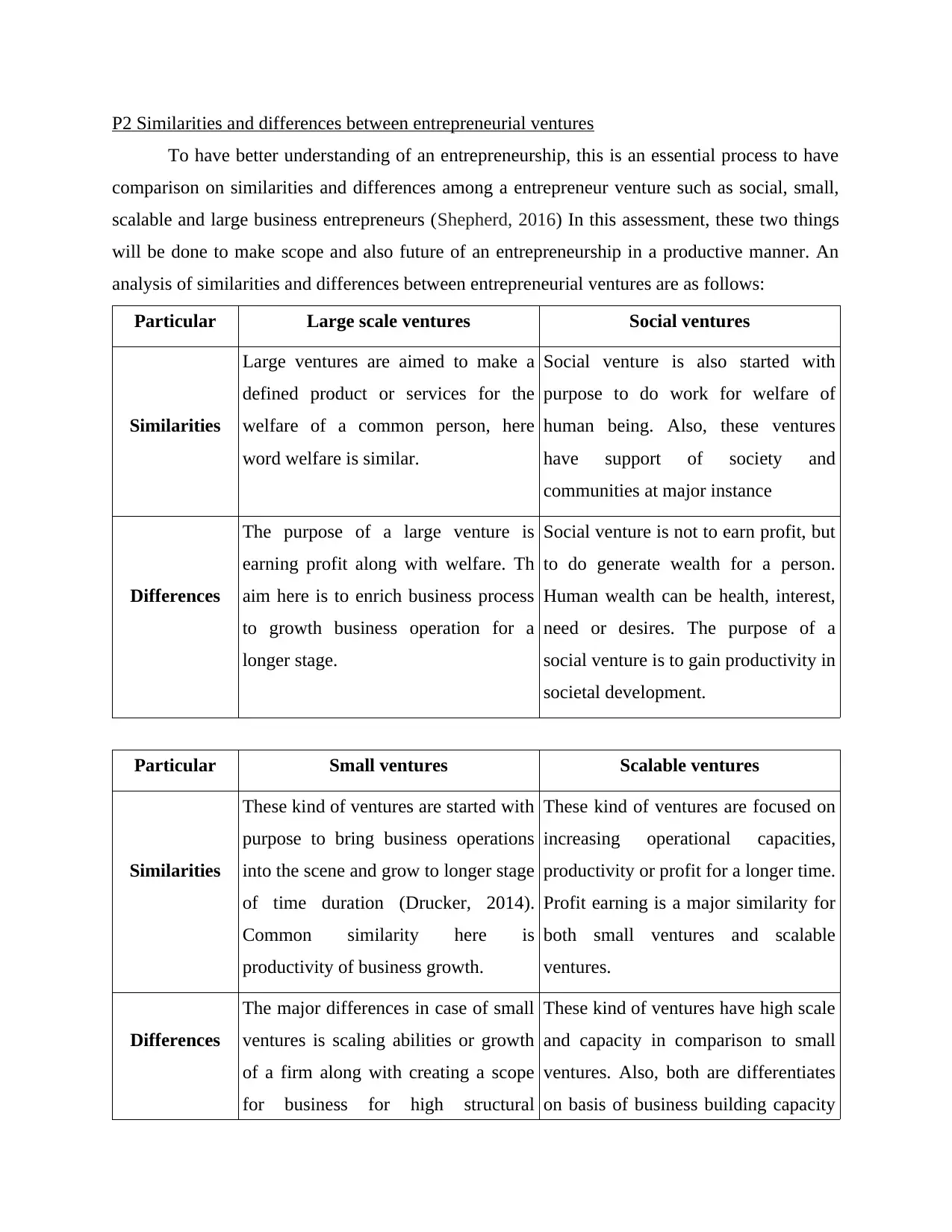
P2 Similarities and differences between entrepreneurial ventures
To have better understanding of an entrepreneurship, this is an essential process to have
comparison on similarities and differences among a entrepreneur venture such as social, small,
scalable and large business entrepreneurs (Shepherd, 2016) In this assessment, these two things
will be done to make scope and also future of an entrepreneurship in a productive manner. An
analysis of similarities and differences between entrepreneurial ventures are as follows:
Particular Large scale ventures Social ventures
Similarities
Large ventures are aimed to make a
defined product or services for the
welfare of a common person, here
word welfare is similar.
Social venture is also started with
purpose to do work for welfare of
human being. Also, these ventures
have support of society and
communities at major instance
Differences
The purpose of a large venture is
earning profit along with welfare. Th
aim here is to enrich business process
to growth business operation for a
longer stage.
Social venture is not to earn profit, but
to do generate wealth for a person.
Human wealth can be health, interest,
need or desires. The purpose of a
social venture is to gain productivity in
societal development.
Particular Small ventures Scalable ventures
Similarities
These kind of ventures are started with
purpose to bring business operations
into the scene and grow to longer stage
of time duration (Drucker, 2014).
Common similarity here is
productivity of business growth.
These kind of ventures are focused on
increasing operational capacities,
productivity or profit for a longer time.
Profit earning is a major similarity for
both small ventures and scalable
ventures.
Differences
The major differences in case of small
ventures is scaling abilities or growth
of a firm along with creating a scope
for business for high structural
These kind of ventures have high scale
and capacity in comparison to small
ventures. Also, both are differentiates
on basis of business building capacity
To have better understanding of an entrepreneurship, this is an essential process to have
comparison on similarities and differences among a entrepreneur venture such as social, small,
scalable and large business entrepreneurs (Shepherd, 2016) In this assessment, these two things
will be done to make scope and also future of an entrepreneurship in a productive manner. An
analysis of similarities and differences between entrepreneurial ventures are as follows:
Particular Large scale ventures Social ventures
Similarities
Large ventures are aimed to make a
defined product or services for the
welfare of a common person, here
word welfare is similar.
Social venture is also started with
purpose to do work for welfare of
human being. Also, these ventures
have support of society and
communities at major instance
Differences
The purpose of a large venture is
earning profit along with welfare. Th
aim here is to enrich business process
to growth business operation for a
longer stage.
Social venture is not to earn profit, but
to do generate wealth for a person.
Human wealth can be health, interest,
need or desires. The purpose of a
social venture is to gain productivity in
societal development.
Particular Small ventures Scalable ventures
Similarities
These kind of ventures are started with
purpose to bring business operations
into the scene and grow to longer stage
of time duration (Drucker, 2014).
Common similarity here is
productivity of business growth.
These kind of ventures are focused on
increasing operational capacities,
productivity or profit for a longer time.
Profit earning is a major similarity for
both small ventures and scalable
ventures.
Differences
The major differences in case of small
ventures is scaling abilities or growth
of a firm along with creating a scope
for business for high structural
These kind of ventures have high scale
and capacity in comparison to small
ventures. Also, both are differentiates
on basis of business building capacity
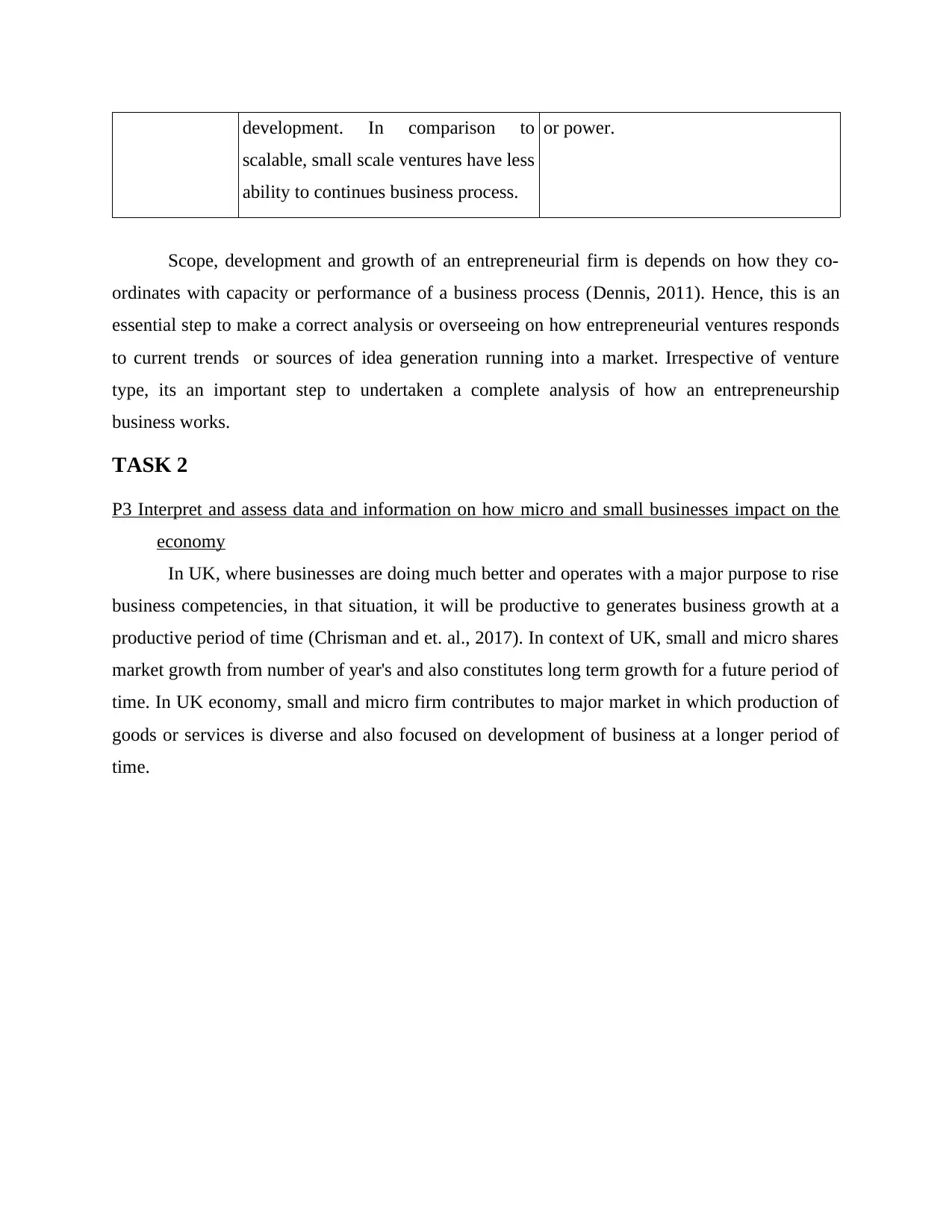
development. In comparison to
scalable, small scale ventures have less
ability to continues business process.
or power.
Scope, development and growth of an entrepreneurial firm is depends on how they co-
ordinates with capacity or performance of a business process (Dennis, 2011). Hence, this is an
essential step to make a correct analysis or overseeing on how entrepreneurial ventures responds
to current trends or sources of idea generation running into a market. Irrespective of venture
type, its an important step to undertaken a complete analysis of how an entrepreneurship
business works.
TASK 2
P3 Interpret and assess data and information on how micro and small businesses impact on the
economy
In UK, where businesses are doing much better and operates with a major purpose to rise
business competencies, in that situation, it will be productive to generates business growth at a
productive period of time (Chrisman and et. al., 2017). In context of UK, small and micro shares
market growth from number of year's and also constitutes long term growth for a future period of
time. In UK economy, small and micro firm contributes to major market in which production of
goods or services is diverse and also focused on development of business at a longer period of
time.
scalable, small scale ventures have less
ability to continues business process.
or power.
Scope, development and growth of an entrepreneurial firm is depends on how they co-
ordinates with capacity or performance of a business process (Dennis, 2011). Hence, this is an
essential step to make a correct analysis or overseeing on how entrepreneurial ventures responds
to current trends or sources of idea generation running into a market. Irrespective of venture
type, its an important step to undertaken a complete analysis of how an entrepreneurship
business works.
TASK 2
P3 Interpret and assess data and information on how micro and small businesses impact on the
economy
In UK, where businesses are doing much better and operates with a major purpose to rise
business competencies, in that situation, it will be productive to generates business growth at a
productive period of time (Chrisman and et. al., 2017). In context of UK, small and micro shares
market growth from number of year's and also constitutes long term growth for a future period of
time. In UK economy, small and micro firm contributes to major market in which production of
goods or services is diverse and also focused on development of business at a longer period of
time.
⊘ This is a preview!⊘
Do you want full access?
Subscribe today to unlock all pages.

Trusted by 1+ million students worldwide
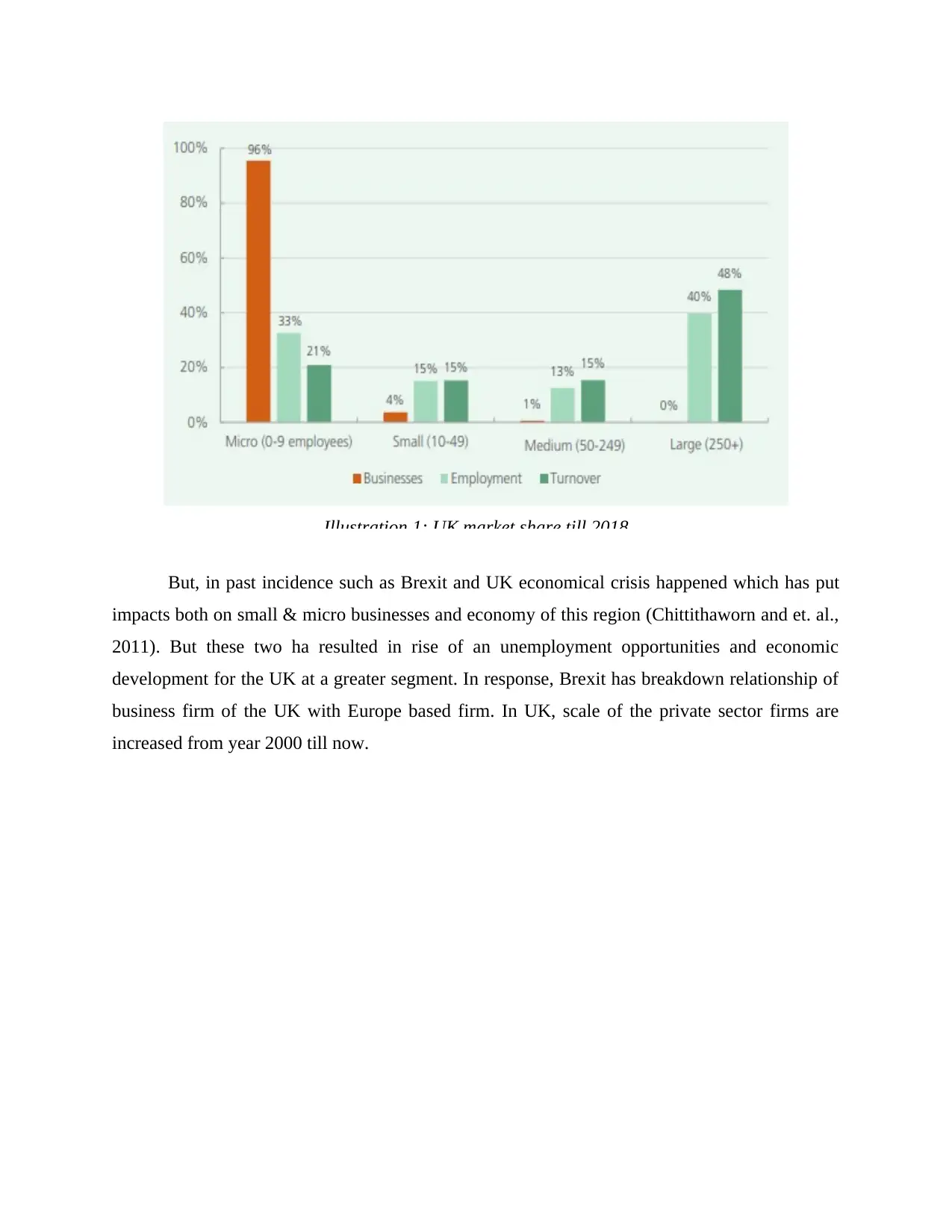
But, in past incidence such as Brexit and UK economical crisis happened which has put
impacts both on small & micro businesses and economy of this region (Chittithaworn and et. al.,
2011). But these two ha resulted in rise of an unemployment opportunities and economic
development for the UK at a greater segment. In response, Brexit has breakdown relationship of
business firm of the UK with Europe based firm. In UK, scale of the private sector firms are
increased from year 2000 till now.
Illustration 1: UK market share till 2018
impacts both on small & micro businesses and economy of this region (Chittithaworn and et. al.,
2011). But these two ha resulted in rise of an unemployment opportunities and economic
development for the UK at a greater segment. In response, Brexit has breakdown relationship of
business firm of the UK with Europe based firm. In UK, scale of the private sector firms are
increased from year 2000 till now.
Illustration 1: UK market share till 2018
Paraphrase This Document
Need a fresh take? Get an instant paraphrase of this document with our AI Paraphraser
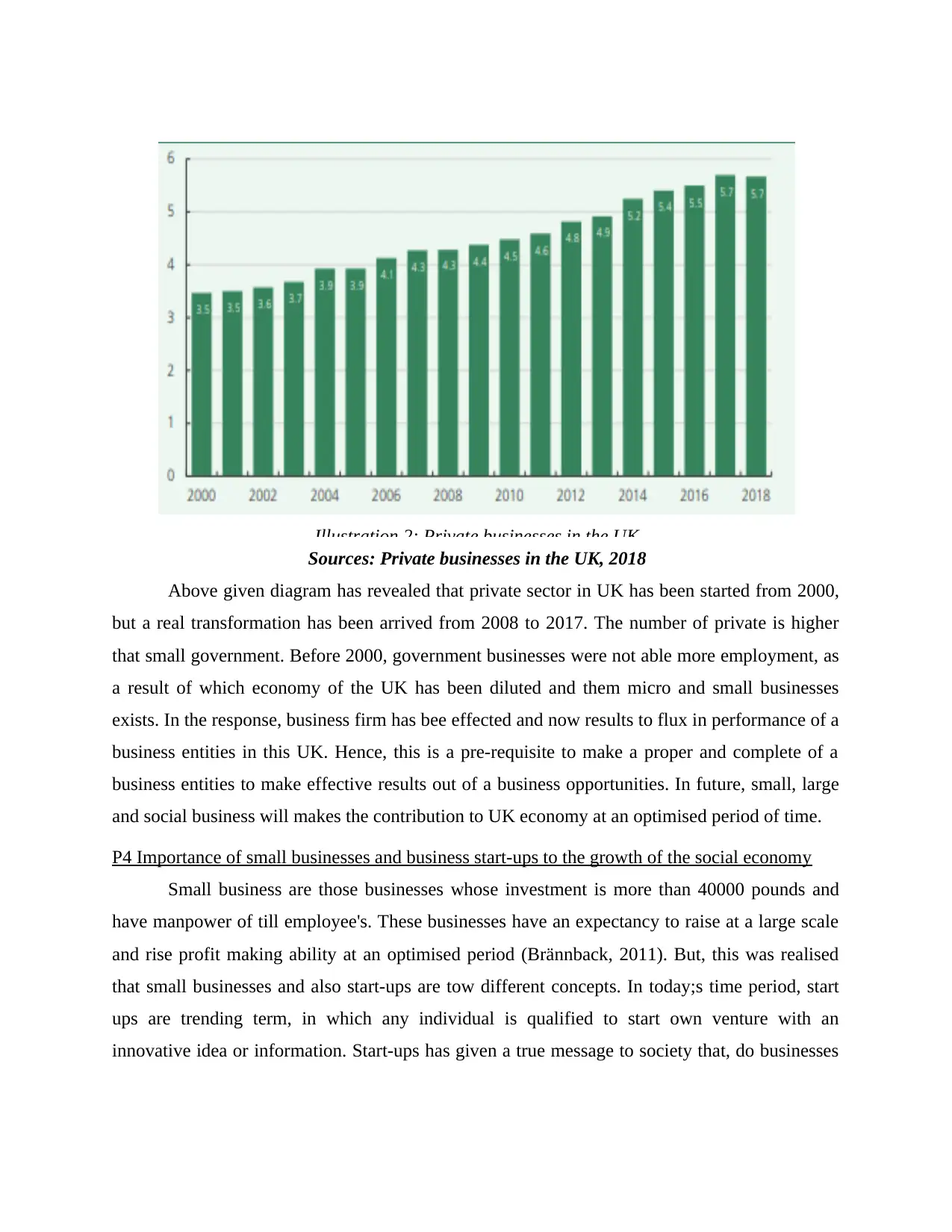
Sources: Private businesses in the UK, 2018
Above given diagram has revealed that private sector in UK has been started from 2000,
but a real transformation has been arrived from 2008 to 2017. The number of private is higher
that small government. Before 2000, government businesses were not able more employment, as
a result of which economy of the UK has been diluted and them micro and small businesses
exists. In the response, business firm has bee effected and now results to flux in performance of a
business entities in this UK. Hence, this is a pre-requisite to make a proper and complete of a
business entities to make effective results out of a business opportunities. In future, small, large
and social business will makes the contribution to UK economy at an optimised period of time.
P4 Importance of small businesses and business start-ups to the growth of the social economy
Small business are those businesses whose investment is more than 40000 pounds and
have manpower of till employee's. These businesses have an expectancy to raise at a large scale
and rise profit making ability at an optimised period (Brännback, 2011). But, this was realised
that small businesses and also start-ups are tow different concepts. In today;s time period, start
ups are trending term, in which any individual is qualified to start own venture with an
innovative idea or information. Start-ups has given a true message to society that, do businesses
Illustration 2: Private businesses in the UK
Above given diagram has revealed that private sector in UK has been started from 2000,
but a real transformation has been arrived from 2008 to 2017. The number of private is higher
that small government. Before 2000, government businesses were not able more employment, as
a result of which economy of the UK has been diluted and them micro and small businesses
exists. In the response, business firm has bee effected and now results to flux in performance of a
business entities in this UK. Hence, this is a pre-requisite to make a proper and complete of a
business entities to make effective results out of a business opportunities. In future, small, large
and social business will makes the contribution to UK economy at an optimised period of time.
P4 Importance of small businesses and business start-ups to the growth of the social economy
Small business are those businesses whose investment is more than 40000 pounds and
have manpower of till employee's. These businesses have an expectancy to raise at a large scale
and rise profit making ability at an optimised period (Brännback, 2011). But, this was realised
that small businesses and also start-ups are tow different concepts. In today;s time period, start
ups are trending term, in which any individual is qualified to start own venture with an
innovative idea or information. Start-ups has given a true message to society that, do businesses
Illustration 2: Private businesses in the UK
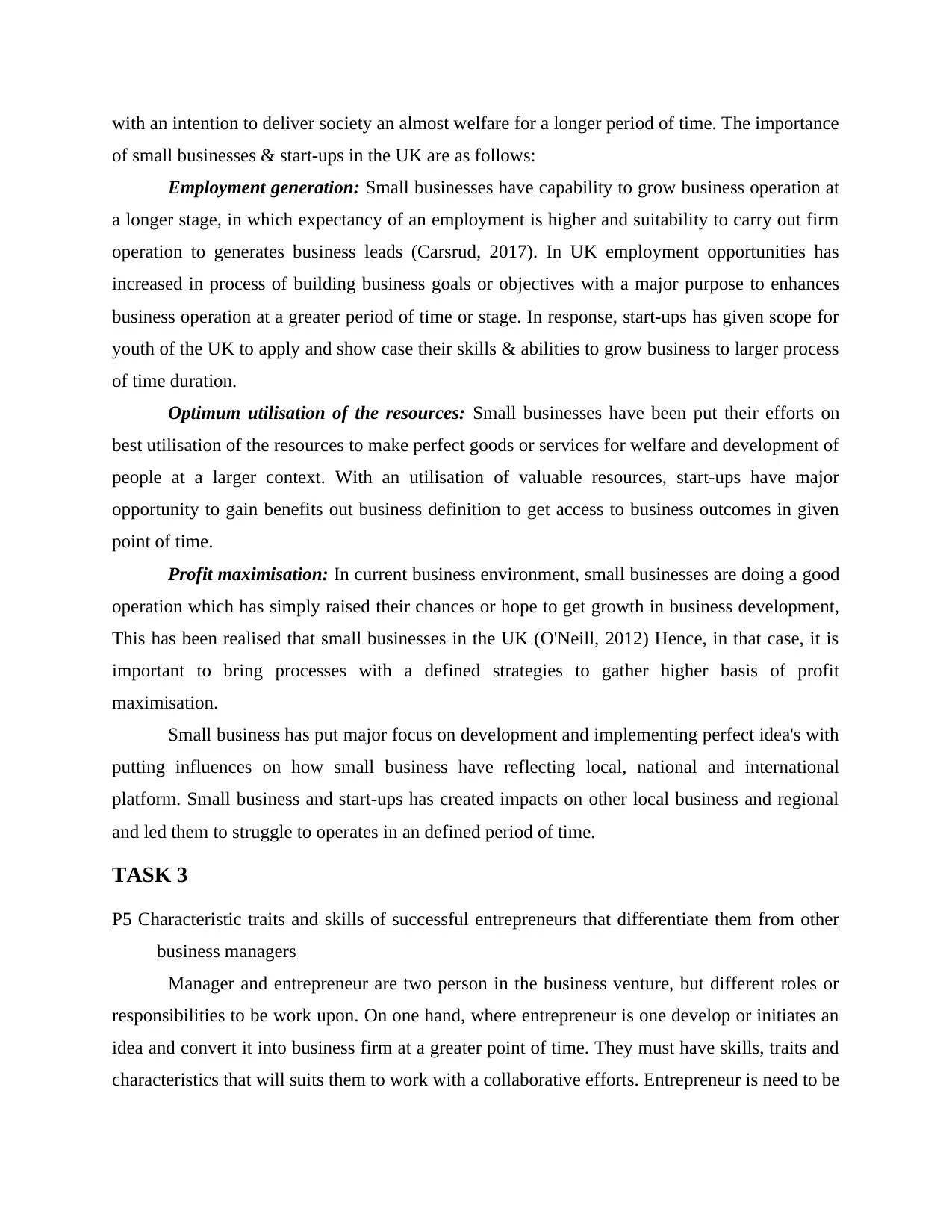
with an intention to deliver society an almost welfare for a longer period of time. The importance
of small businesses & start-ups in the UK are as follows:
Employment generation: Small businesses have capability to grow business operation at
a longer stage, in which expectancy of an employment is higher and suitability to carry out firm
operation to generates business leads (Carsrud, 2017). In UK employment opportunities has
increased in process of building business goals or objectives with a major purpose to enhances
business operation at a greater period of time or stage. In response, start-ups has given scope for
youth of the UK to apply and show case their skills & abilities to grow business to larger process
of time duration.
Optimum utilisation of the resources: Small businesses have been put their efforts on
best utilisation of the resources to make perfect goods or services for welfare and development of
people at a larger context. With an utilisation of valuable resources, start-ups have major
opportunity to gain benefits out business definition to get access to business outcomes in given
point of time.
Profit maximisation: In current business environment, small businesses are doing a good
operation which has simply raised their chances or hope to get growth in business development,
This has been realised that small businesses in the UK (O'Neill, 2012) Hence, in that case, it is
important to bring processes with a defined strategies to gather higher basis of profit
maximisation.
Small business has put major focus on development and implementing perfect idea's with
putting influences on how small business have reflecting local, national and international
platform. Small business and start-ups has created impacts on other local business and regional
and led them to struggle to operates in an defined period of time.
TASK 3
P5 Characteristic traits and skills of successful entrepreneurs that differentiate them from other
business managers
Manager and entrepreneur are two person in the business venture, but different roles or
responsibilities to be work upon. On one hand, where entrepreneur is one develop or initiates an
idea and convert it into business firm at a greater point of time. They must have skills, traits and
characteristics that will suits them to work with a collaborative efforts. Entrepreneur is need to be
of small businesses & start-ups in the UK are as follows:
Employment generation: Small businesses have capability to grow business operation at
a longer stage, in which expectancy of an employment is higher and suitability to carry out firm
operation to generates business leads (Carsrud, 2017). In UK employment opportunities has
increased in process of building business goals or objectives with a major purpose to enhances
business operation at a greater period of time or stage. In response, start-ups has given scope for
youth of the UK to apply and show case their skills & abilities to grow business to larger process
of time duration.
Optimum utilisation of the resources: Small businesses have been put their efforts on
best utilisation of the resources to make perfect goods or services for welfare and development of
people at a larger context. With an utilisation of valuable resources, start-ups have major
opportunity to gain benefits out business definition to get access to business outcomes in given
point of time.
Profit maximisation: In current business environment, small businesses are doing a good
operation which has simply raised their chances or hope to get growth in business development,
This has been realised that small businesses in the UK (O'Neill, 2012) Hence, in that case, it is
important to bring processes with a defined strategies to gather higher basis of profit
maximisation.
Small business has put major focus on development and implementing perfect idea's with
putting influences on how small business have reflecting local, national and international
platform. Small business and start-ups has created impacts on other local business and regional
and led them to struggle to operates in an defined period of time.
TASK 3
P5 Characteristic traits and skills of successful entrepreneurs that differentiate them from other
business managers
Manager and entrepreneur are two person in the business venture, but different roles or
responsibilities to be work upon. On one hand, where entrepreneur is one develop or initiates an
idea and convert it into business firm at a greater point of time. They must have skills, traits and
characteristics that will suits them to work with a collaborative efforts. Entrepreneur is need to be
⊘ This is a preview!⊘
Do you want full access?
Subscribe today to unlock all pages.

Trusted by 1+ million students worldwide
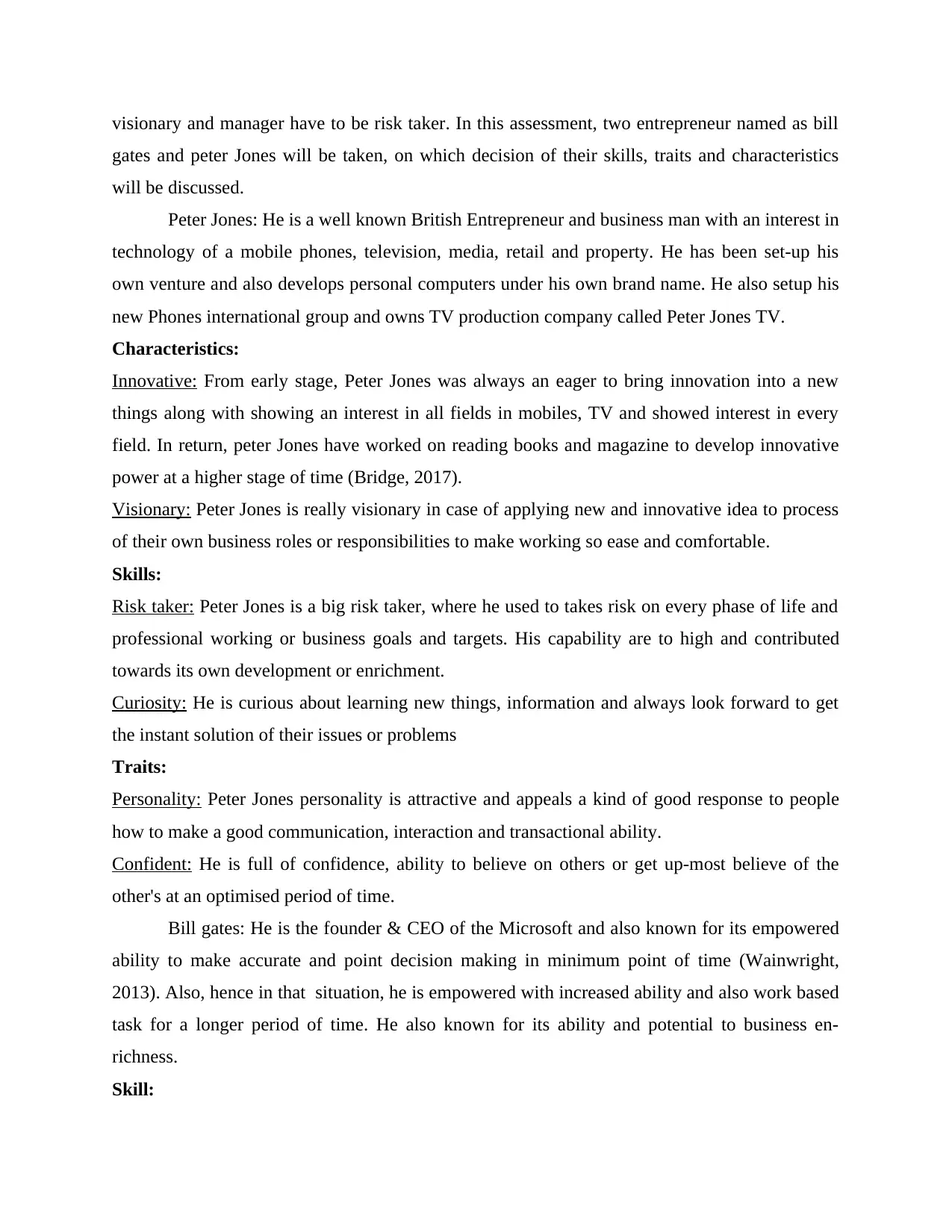
visionary and manager have to be risk taker. In this assessment, two entrepreneur named as bill
gates and peter Jones will be taken, on which decision of their skills, traits and characteristics
will be discussed.
Peter Jones: He is a well known British Entrepreneur and business man with an interest in
technology of a mobile phones, television, media, retail and property. He has been set-up his
own venture and also develops personal computers under his own brand name. He also setup his
new Phones international group and owns TV production company called Peter Jones TV.
Characteristics:
Innovative: From early stage, Peter Jones was always an eager to bring innovation into a new
things along with showing an interest in all fields in mobiles, TV and showed interest in every
field. In return, peter Jones have worked on reading books and magazine to develop innovative
power at a higher stage of time (Bridge, 2017).
Visionary: Peter Jones is really visionary in case of applying new and innovative idea to process
of their own business roles or responsibilities to make working so ease and comfortable.
Skills:
Risk taker: Peter Jones is a big risk taker, where he used to takes risk on every phase of life and
professional working or business goals and targets. His capability are to high and contributed
towards its own development or enrichment.
Curiosity: He is curious about learning new things, information and always look forward to get
the instant solution of their issues or problems
Traits:
Personality: Peter Jones personality is attractive and appeals a kind of good response to people
how to make a good communication, interaction and transactional ability.
Confident: He is full of confidence, ability to believe on others or get up-most believe of the
other's at an optimised period of time.
Bill gates: He is the founder & CEO of the Microsoft and also known for its empowered
ability to make accurate and point decision making in minimum point of time (Wainwright,
2013). Also, hence in that situation, he is empowered with increased ability and also work based
task for a longer period of time. He also known for its ability and potential to business en-
richness.
Skill:
gates and peter Jones will be taken, on which decision of their skills, traits and characteristics
will be discussed.
Peter Jones: He is a well known British Entrepreneur and business man with an interest in
technology of a mobile phones, television, media, retail and property. He has been set-up his
own venture and also develops personal computers under his own brand name. He also setup his
new Phones international group and owns TV production company called Peter Jones TV.
Characteristics:
Innovative: From early stage, Peter Jones was always an eager to bring innovation into a new
things along with showing an interest in all fields in mobiles, TV and showed interest in every
field. In return, peter Jones have worked on reading books and magazine to develop innovative
power at a higher stage of time (Bridge, 2017).
Visionary: Peter Jones is really visionary in case of applying new and innovative idea to process
of their own business roles or responsibilities to make working so ease and comfortable.
Skills:
Risk taker: Peter Jones is a big risk taker, where he used to takes risk on every phase of life and
professional working or business goals and targets. His capability are to high and contributed
towards its own development or enrichment.
Curiosity: He is curious about learning new things, information and always look forward to get
the instant solution of their issues or problems
Traits:
Personality: Peter Jones personality is attractive and appeals a kind of good response to people
how to make a good communication, interaction and transactional ability.
Confident: He is full of confidence, ability to believe on others or get up-most believe of the
other's at an optimised period of time.
Bill gates: He is the founder & CEO of the Microsoft and also known for its empowered
ability to make accurate and point decision making in minimum point of time (Wainwright,
2013). Also, hence in that situation, he is empowered with increased ability and also work based
task for a longer period of time. He also known for its ability and potential to business en-
richness.
Skill:
Paraphrase This Document
Need a fresh take? Get an instant paraphrase of this document with our AI Paraphraser

Enthusiasm: He is enthusiastic about his work or dedicated towards he own goals and objectives
to be accomplished in given point of time.
Leadership skill: Bill gates is well known for its leadership skills and also how he motivates
other to do so. This has revealed that Bill gates have strong insight power.
Characteristic:
Passionate: Bill gates have have high level of the passion, which has resulted him to became
world class business and also lead to accomplish their defined goals or targets in given point of
time.
Full of curiosity: Bill gates of learning new things, idea or innovative knowledge to led a level of
productive development for a longer period of time. This is a proactive steps to make working
and goals accomplishment in an defined matter of time.
P6 How aspects of the entrepreneurial personality reflect entrepreneurial motivation and mindset
This assessment will be possible with support of OCEAN model which stands for
openness to experience, conscientiousness, Extraversion, Agreeableness and Neuroticism. The
explanation on a given is as follows:
Openness to experience: This kind of a personality trait generally tells how
entrepreneurs be open minded to grab all defined opportunities in changing business
environment. Personality has been introduced as an innovative products to become a successful
entrepreneur.
Conscientiousness: This personality traits will desires to work in an effective or defined
manner with a greater level of an efficiency (Blackburn, 2017). In context of Bill gates, he is
desired to work and Peter Jones appeals a kind of an engagements for a longer period of time.
Extraversion: This traits shows an entrepreneur who are highly energetic and also
enthusiastic in nature. These people are more social in nature and highly interacts with an
individuals. Peter Jones is highly energetic in nature and Bill gates is enthusiastic to makes other
energetic.
Agreeableness: These traits majorly involves being sympathetic, co-operative and
compassionate toward the other's. This traits helps to understand other's problems & issues and
also co-ordinates with other in an effective period of time. In nature wise, peter Jones is being
co-operative to other and Bill gates is highly compassionate in nature.
to be accomplished in given point of time.
Leadership skill: Bill gates is well known for its leadership skills and also how he motivates
other to do so. This has revealed that Bill gates have strong insight power.
Characteristic:
Passionate: Bill gates have have high level of the passion, which has resulted him to became
world class business and also lead to accomplish their defined goals or targets in given point of
time.
Full of curiosity: Bill gates of learning new things, idea or innovative knowledge to led a level of
productive development for a longer period of time. This is a proactive steps to make working
and goals accomplishment in an defined matter of time.
P6 How aspects of the entrepreneurial personality reflect entrepreneurial motivation and mindset
This assessment will be possible with support of OCEAN model which stands for
openness to experience, conscientiousness, Extraversion, Agreeableness and Neuroticism. The
explanation on a given is as follows:
Openness to experience: This kind of a personality trait generally tells how
entrepreneurs be open minded to grab all defined opportunities in changing business
environment. Personality has been introduced as an innovative products to become a successful
entrepreneur.
Conscientiousness: This personality traits will desires to work in an effective or defined
manner with a greater level of an efficiency (Blackburn, 2017). In context of Bill gates, he is
desired to work and Peter Jones appeals a kind of an engagements for a longer period of time.
Extraversion: This traits shows an entrepreneur who are highly energetic and also
enthusiastic in nature. These people are more social in nature and highly interacts with an
individuals. Peter Jones is highly energetic in nature and Bill gates is enthusiastic to makes other
energetic.
Agreeableness: These traits majorly involves being sympathetic, co-operative and
compassionate toward the other's. This traits helps to understand other's problems & issues and
also co-ordinates with other in an effective period of time. In nature wise, peter Jones is being
co-operative to other and Bill gates is highly compassionate in nature.
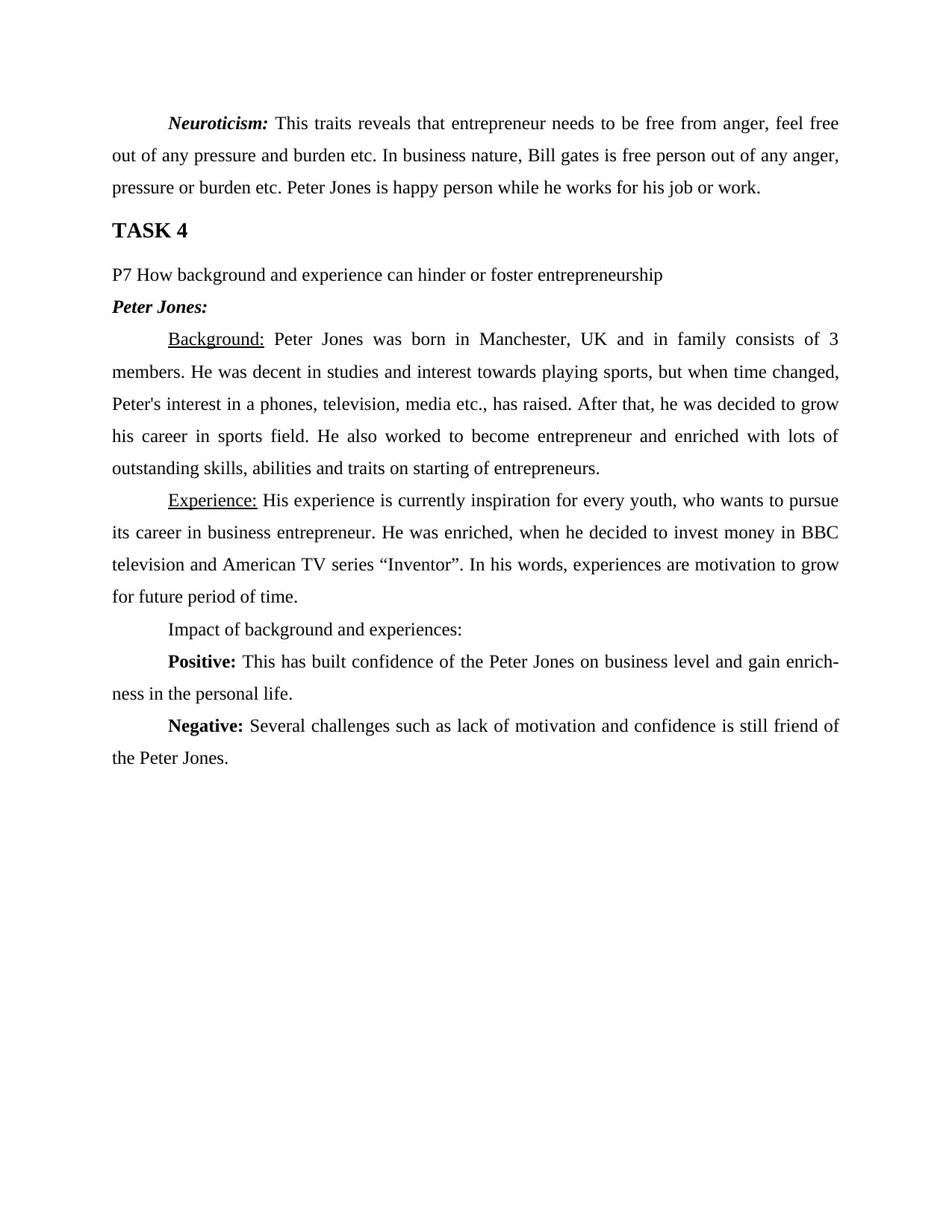
Neuroticism: This traits reveals that entrepreneur needs to be free from anger, feel free
out of any pressure and burden etc. In business nature, Bill gates is free person out of any anger,
pressure or burden etc. Peter Jones is happy person while he works for his job or work.
TASK 4
P7 How background and experience can hinder or foster entrepreneurship
Peter Jones:
Background: Peter Jones was born in Manchester, UK and in family consists of 3
members. He was decent in studies and interest towards playing sports, but when time changed,
Peter's interest in a phones, television, media etc., has raised. After that, he was decided to grow
his career in sports field. He also worked to become entrepreneur and enriched with lots of
outstanding skills, abilities and traits on starting of entrepreneurs.
Experience: His experience is currently inspiration for every youth, who wants to pursue
its career in business entrepreneur. He was enriched, when he decided to invest money in BBC
television and American TV series “Inventor”. In his words, experiences are motivation to grow
for future period of time.
Impact of background and experiences:
Positive: This has built confidence of the Peter Jones on business level and gain enrich-
ness in the personal life.
Negative: Several challenges such as lack of motivation and confidence is still friend of
the Peter Jones.
out of any pressure and burden etc. In business nature, Bill gates is free person out of any anger,
pressure or burden etc. Peter Jones is happy person while he works for his job or work.
TASK 4
P7 How background and experience can hinder or foster entrepreneurship
Peter Jones:
Background: Peter Jones was born in Manchester, UK and in family consists of 3
members. He was decent in studies and interest towards playing sports, but when time changed,
Peter's interest in a phones, television, media etc., has raised. After that, he was decided to grow
his career in sports field. He also worked to become entrepreneur and enriched with lots of
outstanding skills, abilities and traits on starting of entrepreneurs.
Experience: His experience is currently inspiration for every youth, who wants to pursue
its career in business entrepreneur. He was enriched, when he decided to invest money in BBC
television and American TV series “Inventor”. In his words, experiences are motivation to grow
for future period of time.
Impact of background and experiences:
Positive: This has built confidence of the Peter Jones on business level and gain enrich-
ness in the personal life.
Negative: Several challenges such as lack of motivation and confidence is still friend of
the Peter Jones.
⊘ This is a preview!⊘
Do you want full access?
Subscribe today to unlock all pages.

Trusted by 1+ million students worldwide
1 out of 14
Related Documents
Your All-in-One AI-Powered Toolkit for Academic Success.
+13062052269
info@desklib.com
Available 24*7 on WhatsApp / Email
![[object Object]](/_next/static/media/star-bottom.7253800d.svg)
Unlock your academic potential
Copyright © 2020–2026 A2Z Services. All Rights Reserved. Developed and managed by ZUCOL.





